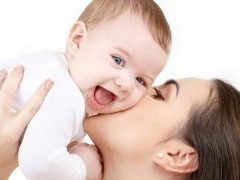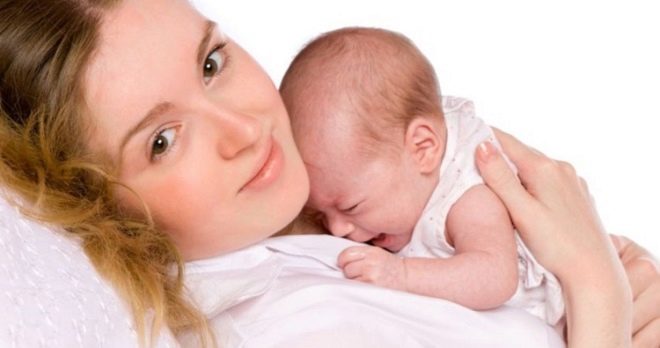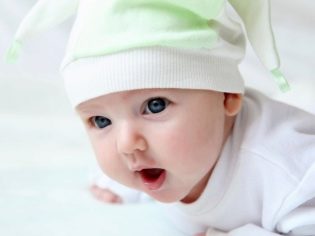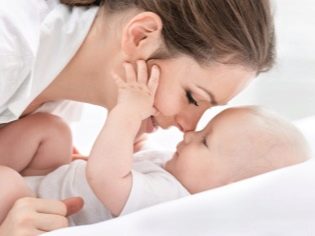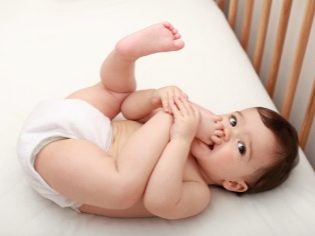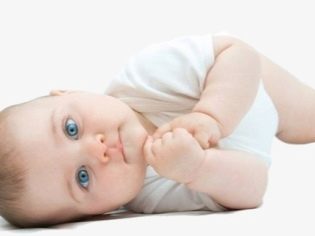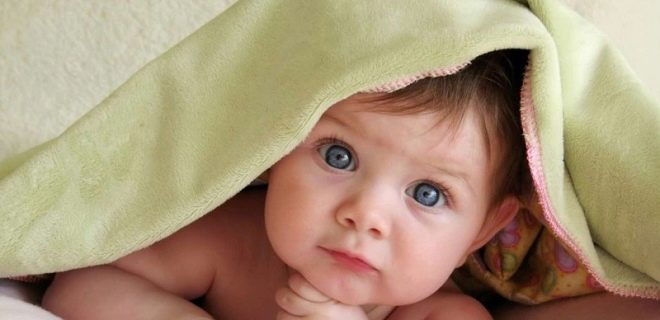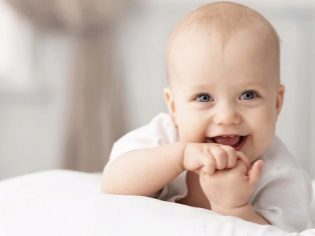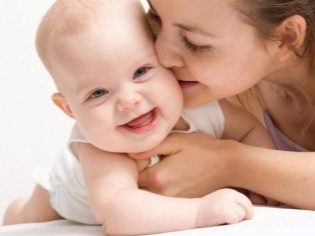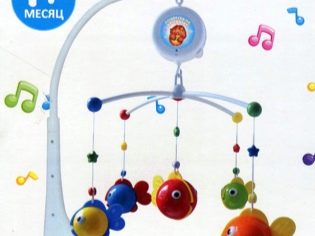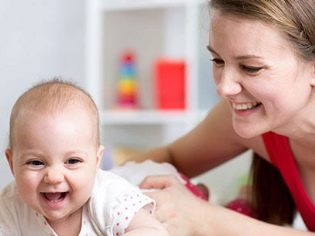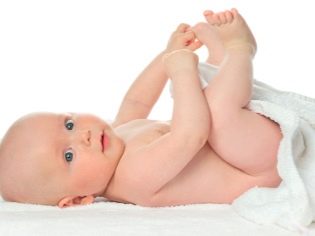When does a baby start laughing out loud?
The laughter of the kid, vivid and sincere, leaves no one indifferent. Babies who have not even learned to speak are especially laughing. In this article we will tell at what age children begin to laugh out loud, how and why this happens or does not occur in a particular case, and also find out whether it is possible to teach a baby to laugh.
Terms and norms
It is difficult to say when humanity began to laugh. Scientists suggest that it happened at a very early stage in the development of civilization. Not only human children can laugh, but also young monkeys, but only in response to tickling. Man's laughter is not always associated with physical effects. This is a psycho-emotional reaction to a variety of life situations.
A newborn child does not know how to laugh, because in order to produce laughter, the muscles of the face must be reduced as needed, the breathing and the work of the vocal cords should definitely change. The only tool for communicating with the world of the newborn is the cry. To them he shows his needs and requirements, and until a certain time he is completely lacking in this.
Yes, babies can smile, but this physiological smile is involuntary, which speaks not of positive emotions, but of spontaneous contraction of the facial nerves on the occasion of intensive formation and "debugging" of the nervous system.
The first conscious smile can appear at the crumbs when he learns to distinguish and recognize the face of the mother, that is, not before the kid learns to focus his eyes on close objects. This usually occurs by 2 months and a little later. At about 2-3 months, the babies begin to roar. They hear their own voice and at first they are alarmed by them, but as the emotional sphere develops, the crumbs begin to perceive their own chilling as rather amusing sounds. It is for the period from 3 to 5 months that the long-awaited development of a new skill is accounted for - the child begins to laugh out loud.
The baby will smile and laugh with sound when he is full, when he is healthy and dry, when he is comfortable and well. At first it will be a quiet and cautious laugh, then the baby will grow bolder and start laughing loudly. After six months, children begin to accumulate daytime impressions, and this can be expressed in laughter in a dream. It is not necessary to be surprised and afraid of this, such laughter is the stage of the formation of the mental and emotional development of the baby.
With the first laughter out loud, numerous parental questions will be bound up. So, quite often moms say that the child starts to hiccup after laughing. This is quite normal, no need to worry, just breathing is involved in laughter, rhythmic ejection of air from the lungs occurs. In this case, a weak children's diaphragm may experience unusual and previously unknown spasms, which will manifest themselves with rhythmic hiccups after laughter.
Why baby is not laughing?
If the little tot has reached the age that is considered optimal for the beginning of laughter, but parents never hear the long-awaited sounds, there may be several reasons for that.
- Lack of readiness of the nervous system. This means that the baby is not physiologically ready to laugh, his nervous system is not strong enough. Most often this is observed in children who were born premature, low-weight, with congenital diseases. Their physical and emotional development comes with some quite natural lag.If you surround your child with attention and love and just wait a little, the baby will surely laugh when “his time” comes.
- There is no clear example. If it is not customary in the family to express their emotions with a loud and sincere laugh, if the mother rarely smiles, then the child simply has no place to learn such a form of expression of feelings as laughter. Children from 2-3 months begin to listen not only to themselves, when it comes time to agitate and roar, but also to those around them. For them, words do not matter, but emotions, intonations, the tone color of an adult’s voice are important. When the mother laughs, the child quickly realizes that this is good, and begins to imitate out loud.
- Such a character. There are funny children, and there are serious and focused. It all depends on the temperament, nature of the character, the innate characteristics of the baby. If he is a “beech” and a thinker, then it will be incredibly difficult to make him laugh. At the same time, it will develop quite normally both physically and mentally. At best, such a peanut will smile, if something will delight him.
- Nervous system lesions, diseases. Lack of laughter can be a sign of emotional immaturity associated with organic brain lesions. This sometimes occurs in children who were born after a severe pregnancy, suffering from hypoxia or from Rh-conflict. The cause may be severe childbirth, cerebral hemorrhage, cerebral edema, ischemic changes, neurological disorders. Lack of laughter often accompanies autism and congenital dementia.
The better the emotional and tactile contact between mother and baby is established, the earlier the crumb begins to smile and laugh. That is why all abandoned children in Baby Houses look so sad - the lack of communication from the first days of life, the retardation of the psycho-emotional sphere do not have a radiant smile and open sincere laughter. Although such children gradually learn these skills, after all, discovering the world around them is very interesting and informative.
Laughter as a system of signals and signs
When the baby learns to laugh out loud, he has an additional tool for communicating with the world. Now he has a scream, smiles and laughter, as well as individual vocal abilities - he agukat or gulit. From this point on, the mother needs to be extremely attentive - the child will use all her new abilities to show exactly what and when she needs.
If the baby reacts with laughter to the tender words addressed to him or to the mother's song, this indicates a well-established contact, a timely psycho-emotional development. Laughter without a reason is also quite natural for a child under one year old. Mom does not seem funny flying feather or speck of dust, and the baby, who sees them for the first time, they seem very funny.
Laughter in response to their own gnosis is also the norm. So the baby gets the first pre-speech skills and he likes it. Examination of the toy and the subsequent deep laugh is an expression of joy, delight.
Nervous protective laughter, which is peculiar to children-neurasthenics, does not show up at the age of one year, like other types of laughter, for example, mocking. It is impossible to diagnose mental illness by the nature, frequency and relevance of laughter in a given situation in infancy - it becomes a symptom of certain deviations not earlier than after 3 years.
Can you teach?
If a baby from the birth of "beech" and melancholic, it will be problematic to teach him to laugh, but there is nothing impossible for a loving mother. And so you need to get down to business. First, analyze for which of the above reasons a baby may not have laughter. If they are pathological, associated with neurological disorders, it is worth consulting with a neurologist. Some children are prescribed sedatives, nootropic drugs. In all other situations, everything is in the hands of the mother.
Laugh “nesmeyanu” will help games such as “Ku-ku”: Mom covers her face with her hands, and then opens it and says to the baby “Koo-ku” with a mandatory smile. Even if at the very beginning the crumb will only look anxiously at the manipulations of the parent, the day will surely come when a familiar movement in combination with a familiar sound will cause an answering smile and laughter.
Babies are usually very happy moderate vibration. That is why you can take the crumbs of the crumbs into your hands and slightly shake the hands, and then the feet of the feet. Accompany these actions can be any funny sounds, such as "br-rr-r" or "ta-ta-ta." Do not shake the child too much, it can lead to undesirable consequences - the nervous system of the infant will be overwhelmed, it will be difficult for him to behave calmly.
From 3 months, babies distinguish the facial expression of adults. Learn to make funny faces. Mom is useful as a mimic gymnastics for wrinkles, and the child will be fun to watch. Before you demonstrate the toddler to another face, show it to yourself in the mirror, so as not to accidentally scare the crumbs.
Very often, children between the ages of 4-5 months begin to react with laughter to unfamiliar words. If you have noticed that such a word was found in your vocabulary, and it arouses interest in the child, repeat it more often, referring specifically to the baby. This will certainly stimulate laughter. The funniest children under one year see long words, for example, “electrical safety”.
Almost all children react to tickling. Do not tickle gloomy karapuz until exhaustion. But a light touch of the teeth to the heel and wrist of the baby, to his tummy with jokes like “Who am I going to eat?” Most often cause precisely ridiculous response. Blowing out parts of a child’s body with a stream of air from its own lungs also has the same wonderful property.
Carefully read the entire range of toys baby. Select only bright ones - yellow and red, preferably sounding. If they are not at all pleased with the little one and he does not want to laugh, show him a primitive puppet theater with the chosen toy, show how it stomps, what sounds it makes, how it “eats” it.
Do I need a doctor?
If the child has enough communication, they play and practice with him, develop him, but the baby does not laugh hard, the mother should pay attention to the associated symptoms. If there are no other complaints, then, most likely, the absence of laughter is a character trait of the baby. Anxiety related symptoms include lack of appetite, general lethargy, decreased tone, pallor or yellowing of the skin, inability and unwillingness to keep the head upright at 5 months, profuse regurgitation, restless sleep, and a particular hysterical or monotonous cry.
With such signs of the child, it is imperative to show the pediatric neurologist and pediatrician. It is possible that there is no laughter due to severe pathologies, serious diseases that have not previously been diagnosed.
To reassure moms, we note that there are not so many diseases that can manifest themselves in this way, and they are not so common. For the most part, with early diagnosis, they are amenable to treatment and correction, and therefore it is not worth delaying the treatment.
How to develop a sense of humor in a child, see the next video from Dr. Komarovsky.
